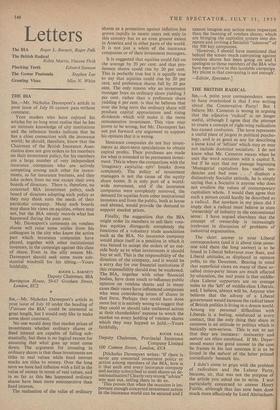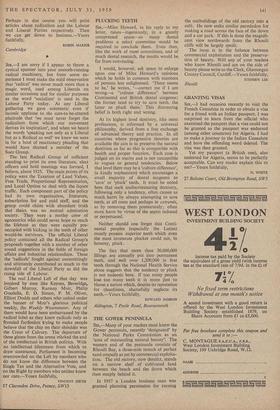THE BRITISH RADICAL Stn,—A point your correspondents seem to have
overlooked is that I was writing about the Conservative Party! But I believe Mr. Cameron is wrong in arguing that the adjective 'radical' is no longer useful, although I agree that the attempt to create a concept of right-wing radicalism has caused confusion. The term represents a useful piece of jargon in political psycho- logy, and is as good as any for describing a loose kind of 'leftism' which may or may not include doctrinal socialism. I do not know what Mr. Cameron means when he uses the word socialism with a capital S, but if he says that my passage beginning 'Managerial capitalism has useful ten- dencies and bad ones . . .' displays a distinctively Socialist attitude, he is simply saying that a Socialist is anyone who does not swallow the values of contemporary capitalism whole. I would then agree that such a person could hardly be described as a radical. But nowhere in my piece did I imply that a radical must believe in state `ownership' of industry in the conventional sense: I have argued elsewhere that the concept of ownership is increasingly irrelevant in discussion of problems of industrial organisation.
The short answer to your Liberal correspondents (and it is about time some- , one told them the long answer) is to be found in Liberal behaviour over Suez, and Liberal attitudes, as displayed in opinion polls, to the Deterrent. Bearing in mind that superficial views on many of these so- called cross-party issues are much affected by education, the real point is that middle- class Labour supporters are on average miles to the 'left' of middle-class Liberals, and, I believe, always will be. Anyone who believes that the advent of a Liberal government would increase the radical tenor of British politics is living in a dream world. Among my personal difficulties with Liberals is a feeling, reinforced at every contact, that the only thing they share in common is an attitude to politics which is basically non-serious. This is not to say that they are insincere: insincerity and naiveté are often combined. If Mr. Deyer- mond wants one good answer to the case he frames in his last sentence it is to be found in the naiveté of the letter printed immediately beneath his.
I didn't come to grips with the problem of radicalism and the Labour Party, because, sir, that was not the purpose of the article you asked me to write. I was particularly concerned to answer Henry Fairlie, although that has now been done much more effectively by Lord Altrincham. Perhaps in due course you will print articles about radicalism and the Labour and Liberal Parties respectively. Then we can get down to business.—Yours faithfully,































 Previous page
Previous page